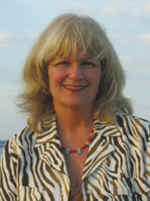A
Sense of Place
by
Audrey Hingley, Contributing Columnist
|

Audrey
Hingley
|
After my mother passed away in 1991,
Mama�s sister, my Aunt Rose, became a sort of surrogate parent for me
until her own death in 1999. With the death of my mom and another sister,
Aunt Rose �adopted� her orphaned adult nieces and nephews, dispensing
not only family history, but the wisdom that comes only from a shared sense
of place, time and family.
I think a lot these days about a sense
of place in today�s fast-paced, frantic world. Aunt Rose�s growing-up
world paralleled my parents� world, for all were reared on rural Virginia
farms. From rising in pre-dawn darkness to milk cows to juggling farm chores
with schoolwork, their childhoods were challenging. My grandfathers, both
maternal and paternal, rose in the wee hours of the morning to hitch a mule
to a cart loaded with produce. It took several hours to make the
12-to-15-mile jaunt to the city market to sell the farm�s bounty. But
family and friends worked together and helped each other.
Aunt Rose�s and my parents�
growing-up years were spent without electricity. Electricity had not yet
arrived in rural areas. Light came from dim oil lamps and meals were
prepared on wood cook stoves. Water was drawn from a well and clothes were
washed by hand on a washboard. Aunt Rose once recalled with a laugh, �They
call that �the good old days� ... to me, the good old days are now!�
I never lived on a farm, but I visited
my maternal grandparents� farm regularly. The old mule in the barn and the
heady, sweet aroma of honeysuckle in the apple orchard were only a short
walk away. By the time I was a teenager, my grandparents had died and
farmland was disappearing into suburbs; yet my parents always had a
vegetable garden. Mama remained a farm girl at heart, and summer was a time
for shelling green beans, making pickles from fresh cucumbers and canning
nature�s bounty.
That sense of place, from my
grandparents� farm to my childhood home to chatting over coffee at Aunt
Rose�s kitchen table in the last years of her life, linked generations,
even those who have now passed from sight. Work was shared but so was fun. A
sense of place is something embedded in your psyche, anchoring your heart no
matter where you live, but it seems particularly heightened in rural
environments.
People climbing career ladders often
move frequently for job promotions. Military families have always endured
the challenge of frequent moves and indeed, some people thrive on constant
change. But most people seem to want a sense of place, which hinges on
relationships and not just geography.
Last November my husband and I opened a
furniture/antiques store in the Colonial port town of Urbanna. Once after a
long day of building renovation work, we decided to have dinner at a local
restaurant before making the hour�s drive home. My husband had only work
clothes so he visited a town fixture, Bristow�s Store, to buy suitable
clothes. When I told the sales clerk we were going out to dinner, she
snatched the clothes and soon returned with freshly pressed shirt and pants.
I recall thinking how such service was once likely commonplace; today its
rarity is one reason why towns like Urbanna are so appealing.
We are fast losing a sense of place, but
it�s not too late. God, church, family, friends, community � all provide
a sense of place. We have to want it; it doesn�t just happen naturally as
it may have in earlier times. We have to make time for relationships. Modern
life has too many distractions.
There are some signs that society may be
turning. Magazines and books tout a return to simplicity. Some major cities
are losing residents, while rural populations have jumped in the post 9-11
world. Can it be that people
are actually longing for a sense of place and the values it represents? Can
it be that perhaps some of the �good old days� are, indeed, still good?
Aunt Rose knew the importance of having
a sense of place. It was one of the things, I believe, that sustained her
through the death of her only son, a husband, sisters and many other life
losses.
She never stopped reaching out, doing
for others, sharing with others. To me, that�s the real meaning of a sense
of place.